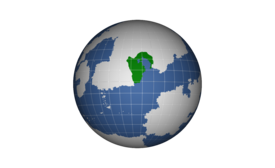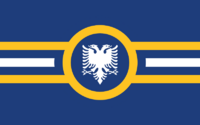Huvakia
The Allied States of Huvakia Tsad ve Haatvekadé | |
|---|---|
| Motto: Susulur, haa'taylir, cuyir shev'la | |
 | |
| Capital | Aloriya |
| Demonym(s) | Huvakian |
| Government | |
• Alorvé Alor | Oraksha Bikadinir |
• Jorhaa'gai'Adadé | Uoi'étota Mondasika |
| Legislature | Karyai be Adadé'urcir |
| Tribal Unification | |
| Population | |
• 2020 estimate | 27 Million |
| GDP (nominal) | 2020 (estimate) estimate |
• Total | 635.547 Billion |
• Per capita | 251,475 |
| HDI | .89 very high |
| Date format | dd-mm-yyyy |
| Driving side | right |
| Calling code | (767) |
The Tsad ve Haatvekadé (Zhad ve Ha-aht-veh-kah-day) more commonly known as The Allied States of Huvakia (A.S.H), is an efficient nation comprised of the main island of Huvakia which accounts for 97% of A.S.H territory with the remainder being made up by several smaller islands. Huvakia is notable for its efficient economy, and near complete absence of violent crime among the population of 27 Million. The efficient Huvakian economy, worth a remarkable 635 billion Credits a year, is diversified and led by the information technology industry with significant contributions from the shipbuilding, and fishing industries. State-owned companies are common. Crime, especially youth-related, is almost totally unknown, thanks to the well funded police force and progressive social policies in education and welfare. Huvakia's national animal is the Rottweiler, which frolics freely in the nation's many lush southern forests.
Etymology
"Tsad ve Haatvekadé" (Ha-aht-veh-kah-day) translates roughly from native adadé to "union honoring the deal of the people", referencing the end of tribal conflict among the historical tribes of Huvakia.
History
Tribal
Imperial Expansion
Industria Revolution
Discovery of Oil
Geography
Climate
Huvakia is largely characterised by a humid subtropical climate (Köppen Cwa). Summer is hot and humid, with occasional showers and thunderstorms and warm air from the southwest. Typhoons occur most often then, sometimes resulting in floods or landslides. Winters are mild and usually sunny at the beginning, becoming cloudy towards February; an occasional cold front brings strong, cooling winds from the north. The most temperate seasons are spring and autumn, which is generally sunny and dry. When there is snowfall, which is rare, it is usually at high elevations. In southern Huvkia the city of Kahusaé averages 1,709 hours of sunshine per year.
Environment
Politics and Government
Military
The Alorvé Alor serves as supreme commander and chief of the armed forces which is administered by the Din'kartadé. A self defense force aimed primarily at localised defense of the home island.
Foreign Relations
Economy
In 2018, automobiles,hemp products, and information technology were the largest import commodity, while crude oil and military equipment are the country's largest export.
Energy
The Imperial energy market is about 29,000 terawatt hours per year. In 2018, 30% of this energy came from petroleum, 15% from coal, and 10% from natural gas. The remainder was supplied by the nations nuclear reactor and renewable energy sources. Prometheus Imperial Power is the largest energy company in Huvakia.
Infrastructure
Issues that affect water supply in the Empire include droughts in the West, pollution, a backlog of investment, concerns about the affordability of water for the poorest, and a rapidly retiring workforce. Increased variability and intensity of rainfall as a result of climate change is expected to produce both more severe droughts and flooding, with potentially serious consequences for water supply and for pollution from combined sewer overflows.
Transport
The average adult (accounting for all drivers and non-drivers) spends 37 minutes driving every day, traveling 19 miles (47 km). In 2017, there were 15,009,283 motor vehicles—including cars, vans, buses, freight, and other trucks, but excluding motorcycles and other two-wheelers. Mass transit accounts for 39% of total work trips. Transport of goods and passengers by rail is extensive. Bicycle usage for work commutes is minimal but has seen an increase in response to some covid guidelines. The civil airline industry is predominantly owned by the government though some foreign airlines are allowed to operate. Huvakia possess one international airport and two regional.


